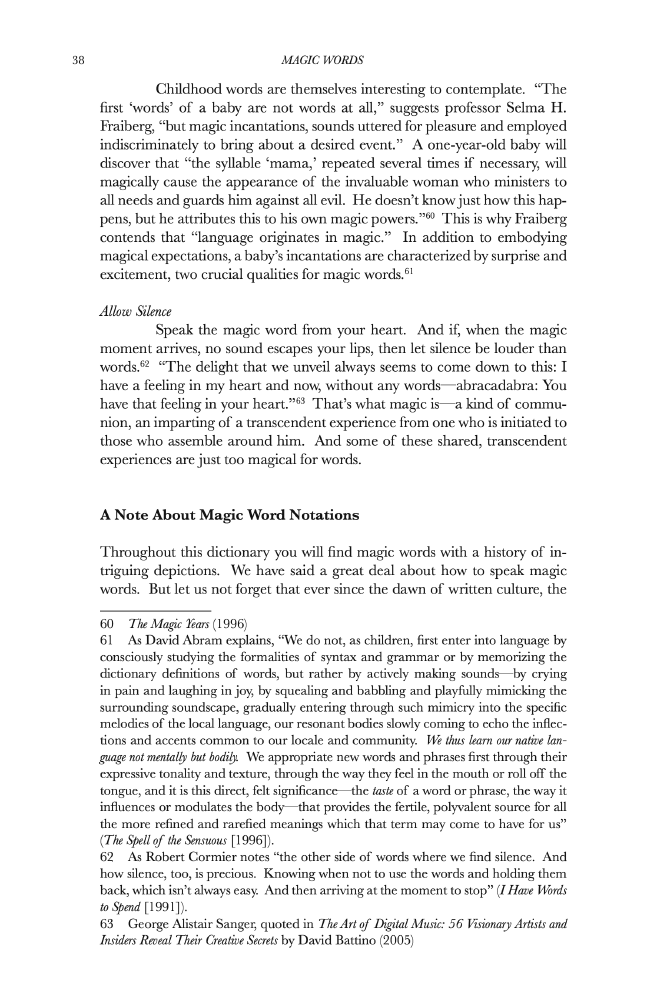
8 MAGIC WORDS
Childhood words are themselves interesting to contemplate. "The
first 'words' of a baby are not words at all," suggests professor Selma H.
Fraiberg, "but magic incantations, sounds uttered for pleasure and employed
indiscriminately to bring about a desired event." A one-year-old baby will
discover that "the syllable 'mama,' repeated several times if necessary, will
magically cause the appearance of the invaluable woman who ministers to
all needs and guards him against all evil. He doesn't know just how this happens,
but he attributes this to his own magic powers." 0 This is why Fraiberg
contends that "language originates in magic." In addition to embodying
magical expectations, a baby's incantations are characterized by surprise and
excitement, two crucial qualities for magic words.61
Allow Silence
Speak the magic word from your heart. And if, when the magic
moment arrives, no sound escapes your lips, then let silence be louder than
words. "The delight that we unveil always seems to come down to this: I
have a feeling in my heart and now, without any words -- abracadabra: You
have that feeling in your heart." That's what magic is -- a kind of commu
nion, an imparting of a transcendent experience from one who is initiated to
those who assemble around him. And some of these shared, transcendent
experiences are just too magical for words.
A Note About Magic Word Notations
Throughout this dictionary you will find magic words with a history of intriguing
depictions. We have said a great deal about how to speak magic
words. But let us not forget that ever since the dawn of written culture, the
0 The Magic Years (1996)
61 As David Abram explains, "We do not, as children, first enter into language by
consciously studying the formalities of syntax and grammar or by memorizing the
dictionary definitions of words, but rather by actively making sounds -- by crying
in pain and laughing in joy, by squealing and babbling and playfully mimicking the
surrounding soundscape, gradually entering through such mimicry into the specific
melodies of the local language, our resonant bodies slowly coming to echo the inflections
and accents common to our locale and community. We thus learn our native language
not mentally but bodily. We appropriate new words and phrases first through their
expressive tonality and texture, through the way they feel in the mouth or roll off the
tongue, and it is this direct, felt significance -- the taste of a word or phrase, the way it
influences or modulates the body -- that provides the fertile, polyvalent source for all
the more refined and rarefied meanings which that term may come to have for us"
(The Spell of the Sensuous [1996]).
62 As Robert Cormier notes "the other side of words where we find silence. And
how silence, too, is precious. Knowing when not to use the words and holding them
back, which isn't always easy. And then arriving at the moment to stop" (I Have Words
to Spend [1991]).
6 George Alistair Sanger, quoted in The Art of Digital Music: 56 Visionary Artists and
Insiders Reveal Their Creative Secrets by David Battino (2005)